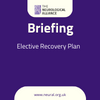What does the Elective Recovery Plan mean for people with neurological conditions?
10/02/2022
This week, NHS England and NHS Improvement published their blueprint for tackling the backlog of elective care and reducing waiting times. This week also saw publication of NHS waiting times data for December 2021.
Neurosurgery saw 51,195 people waiting for an appointment, 7% (3,584) of whom had been waiting for more than a year. In neurology, the figure is 174,243 with 2% (3,485) waiting more than 12 months for an appointment.
The Delivery Plan for Tackling the COVID-19 Backlog of Care includes ambitions and approaches to reduce and ultimately eliminate long waits for NHS appointments. It also includes guidance for local health systems around improving communication with and support for people while they are waiting.
Read our full briefing here.
Scale of the challenge
The plan acknowledges the huge scale of the challenge facing the health system in recovering from the impact of the pandemic. It is important to see the impact of COVID-19 as exacerbating pre-existing challenges in relation to receiving timely access to services and support for people with neurological conditions that were present before the pandemic.
The plan includes welcome reference to neurosurgery and sets out measures, including increasing collaboration with the independent sector, for releasing capacity from other areas in the NHS to allow more complex procedures including neurosurgery to take place.
However, the plan does not include a comprehensive strategy to address long-term workforce shortages in neuroscience. And the plan to eliminate waiting lists of over a year by 2025 is considered an ambition rather than a firm commitment. It is also notable that this date will fall after the next UK general election – significant progress must be made before then.
When announcing the plan in the House of Commons, the Health Secretary Sajid Javid noted that even with the plan waiting lists would not start falling for two years, with six million people currently on a waiting list and up to a further ten million people still waiting for care who have not come forward during the pandemic.
This is likely to provide little consolation to the thousands of people with neurological conditions who have been waiting for over 12 months for an appointment.
Georgina Carr, Chief Executive of The Neurological Alliance,said:
“For the 230,000 people or more currently waiting for an NHS neurosurgery or neurology appointment, this elective recovery plan offers only some comfort that their wait is nearing an end.”
Without the right workforce in place or necessary focus on neuroscience services, people with suspected and confirmed neurological conditions will continue to wait. The pressures on NHS elective care are significant, but continued delays to treatment and care can mean people living in enormous pain or seeing their condition get worse.”
“We urge the UK Government to set out a comprehensive plan to support and grow our neuroscience workforce, so that people with neurological conditions can access the right professional input and treatment at the right time.”
What next
Moving forward we will be urging the neuroscience Clinical Reference Group to discuss the plan and to make the case for the CRGs involvement in the prioritisation of waiting lists.
We will also make the case to Integrated Care Systems (ICSs) to set out their recovery plans for neuroscience and analyse data from our recently closed patient experience survey to better understand the impact of the pandemic on our community and identify which groups of people with or suspected neurological conditions are particularly impacted by the current backlog.
Download our full briefing here.

Follow us on Facebook, Twitter and Instagram for the latest news.





